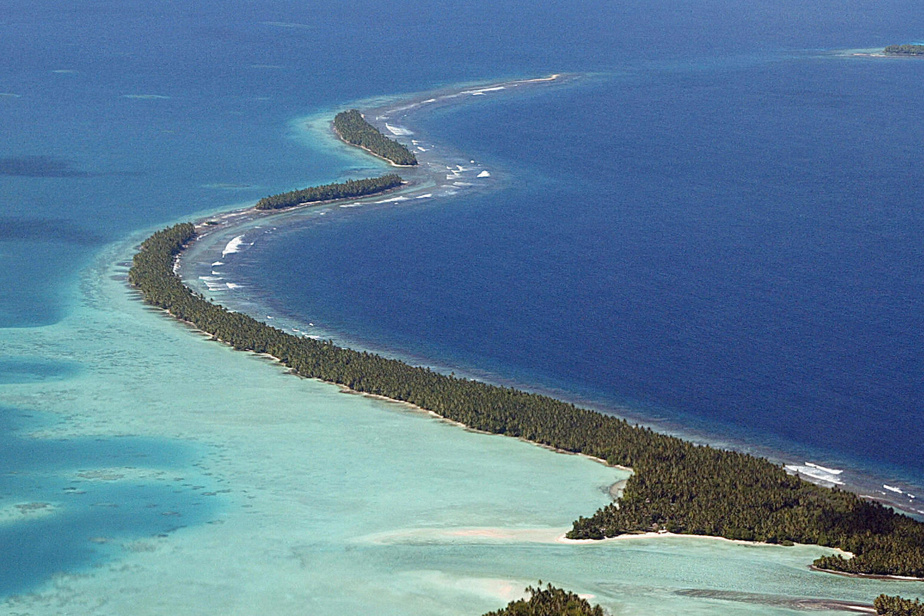
(United Nations) If the sea swallowed the Maldives or Tuvalu, would it wipe the country off the map and its citizens with it? This unimaginable damage caused by climate change represents an unprecedented danger to the international community and people are at risk of losing their identity as well.
Posted at 11:32 pm yesterday.
“This is the biggest tragedy that a people, a nation, a country can face,” former Maldives president Mohamed Nasheed told AFP.
According to the UN Climate Experts (IPCC), sea level has already risen by 15 to 25 cm since 1900, and the rise is accelerating at an even faster rate in some tropical regions.
Thus, if emissions continue to rise, by the end of the century the oceans could gain nearly an additional meter around the Pacific and Indian Ocean islands.
It’s certainly below the high point of the flat small island states, but rising waters are accompanied by an increase in storms and wave-submersion: water and land become polluted with salt, before long uninhabitable atolls form. are covered by the sea.
According to a study cited by the IPCC, five states (Maldives, Tuvalu, Marshall Islands, Nauru and Kiribati) are at risk of becoming uninhabitable by 2100, creating 600,000 stateless climate refugees.
“Legal Fiction”
An unprecedented situation. States were wiped off the map by wars. But “we’ve never seen a state completely lose land due to a physical event like sea level rise,” said Sumudu Atapattu of the University of Wisconsin-Madison.
However, the Montevideo Convention of 1933 on the Rights and Duties of States, the reference in this regard is clear: a state is composed of a defined territory, a permanent population, a government and the ability to interact with other states.
So if the territory is swallowed up or no one can survive on what’s left of it, at least one standard will come.
But Sumudu argues bluntly that “the concept of the state is a legal fiction created for the purposes of international law. So we can create a new fiction to include these wretched states”.
This is the idea behind the “Rising Nations” initiative launched in September by several Pacific governments: “To convince UN members to recognize our country, even if we are submerged, because this is our identity,” Tuvalu Prime Minister Kousia Natano told AFP.
Some are already thinking about how to use these 2.0 nation states. Kamal Amakran, director of the Center for Climate Mobility at Columbia University, told AFP: “You can have territory somewhere, population somewhere else and government third.”
This would first require a “political declaration” from the UN, then an “agreement” between the threatened state and a “host state”, some sort of permanent embassy and willing to welcome the government-in-exile into its population. Nationality
The former UN official also drew attention to the ambiguity of the Montevideo Convention: “When we talk about territory, is it dry land or maritime territory? “.
“Intelligent Humans”
Thanks to its 33 islands scattered over 3.5 million km2 Kiribati, the smallest land area in the Pacific, has one of the largest Exclusive Economic Zones (EEZs) in the world.
If this maritime sovereignty is preserved, a state will not disappear, some experts assure.
With some islands already submerged and coastlines receding, freezing EEZs would preserve access to all-important resources.
In an August 2021 declaration, members of the Pacific Islands Forum, including Australia and New Zealand, incidentally declared that “their maritime zones will continue to apply, without reduction, regardless of the physical changes associated with sea-level rise”.
But, in any case, some do not consider leaving their threatened country.
“Humans are clever, they find floating ways to live there,” said Mohammed Nasheed, referring to the floating cities.
But these states do not have the resources for such projects. Financing the “loss and damage” caused by the effects of global warming will also be a topic of discussion at COP27 in Egypt in November.
For his part, Kamal Amakrane insists, “You always need a plan B,” even while advocating the “right to exist” and not abandoning one’s land and “his heritage”.
With this in mind, he called for a “political” process to be initiated “as soon as possible” to “give hope to the population” to preserve uninhabitable states in the future.
Because the current uncertainty “creates bitterness and confusion and with it, we kill a nation, a people”.








